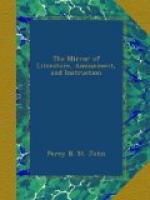Besides these rare convivial accomplishments, his gay and jovial temper rendered him the life of the table. There was no resisting his droll faces, his droll stories, his jokes, his tricks, or his laugh—the most contagious cachination that ever was heard. Nothing in the shape of fun came amiss to him. He would join in a catch or roar out a solo, which might be heard a mile off; would play at hunt the slipper or blind man’s buff; was a great man in a country dance, and upon very extraordinary occasions would treat the company to a certain remarkable hornpipe, which put the walls in danger of tumbling about their ears, and belonged to him as exclusively as the Hazelby sauce. It was a sort of parody on a pas seul which he had once seen at the Opera-house, in which his face, his figure, his costume, his rich humour, and his strange, awkward, unexpected activity, told amazingly. “The force of frolic could no farther go” than “the Doctor’s hornpipe,” It was the climax of jollity.
* * * * *
In his shop and his household he had no need either of partner or of wife: the one was excellently managed by an old rheumatic journeyman, slow in speech, and of vinegar aspect, who had been a pedagogue in his youth, and now used to limp about with his Livy in his pocket, and growl as he compounded the medicines over the bad latinity of the prescriptions; the other was equally well conducted by an equally ancient housekeeper and a cherry-cheeked niece, the orphan-daughter of his only sister, who kept every thing within doors in the bright and shining order in which he delighted. John Hallett, notwithstanding the roughness of his aspect, was rather knick-knacky in his tastes; a great patron of small inventions, such as the improved ne plus ultra cork-screw, and the latest patent snuffers. He also trifled with horticulture, dabbled in tulips, was a connoisseur in pinks, and had gained a prize for polyanthuses. The garden was under the especial care of his pretty niece, Miss Susan, a grateful warm-hearted girl, who thought she never could do enough to please her good uncle, and prove her sense of his kindness. He was indeed as fond of her as if he had been her father, and as kind.
Perhaps there was nothing very extraordinary in his goodness to the gentle and cheerful little girl who kept his walks so trim and his parlour so neat, who always met him with a smile, and who (last and strongest tie to a generous mind) was wholly dependent on him—had no friend on earth but himself. There was nothing very uncommon in that. But John Hallett was kind to every one, even where the sturdy old English prejudices, which he cherished as virtues, might seem most likely to counteract his gentler feelings.
* * * * *
“The Evening Song of the Tyrolese Peasants” by Mrs. Hemans, must close our extracts from the present volume:—
Come to the Sun-set Tree!
The day is past and gone;
The woodman’s axe lies free,
And the reaper’s work
is done.




